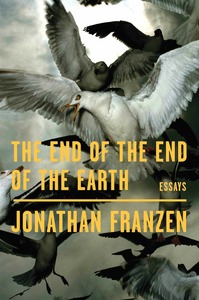You need to sign in or sign up before continuing.
Take a photo of a barcode or cover
adventurous
challenging
emotional
informative
inspiring
reflective
fast-paced
I’ll be honest: my feelings about this book are a bit mixed. I will start with my more negative feelings. I rather disliked Franzen’s persona as a writer. I found him to be a bit arrogant, judgmental, and self-loathing in the way that still lacks self-awareness. I confess, I was immediately put off by his reference to Montaigne at the beginning of his first essay; in my experience, the essayists who revere Montaigne and disdain other styles of creative non-fiction are frequently insufferable. Even though I occasionally felt sympathy for him as a reader throughout his essays, I came away feeling he was a bit of a jerk also.
However, he’s the kind of jerk that you end up begrudgingly agreeing with on several points. While not all of the essays in this book were about traditionally “environmental” topics, I think he raises a lot of good questions and starts conversations worth having. I particularly liked his points about where the focus of our discussions about the environment should be, learning to “save what we love” in addition to tackling the more dispersed problem of climate change, to not give up on conservation and connection to landscape just because climate change feels like a more overwhelming concern. And his attachment to birds is actually kind of charming: “Even the most ominously degraded landscape could make me happy if it had birds in it” (44).
And I really like his point that talking about climate can be alienating for many of us, since it involves problems and phenomena that are so dispersed it’s hard to engage with them directly, or they’re being perpetuated by forces beyond most individuals’ control. Some of his language about reducing carbon footprint “[saving] nothing” seems a little dismissive and extreme, but I find myself agreeing that it is still a meaningful use of time and energy to focus on environmental issues and dynamics that are not centered on climate change.
In “Capitalism in Hyperdrive”, Franzen also touched on a point that really resonated with me about inequality in people’s capacities to act or to care about things. Discussing digital technology, Franzen asks “But what of the great mass of people too anxious or lonely to resist the lure of tech, too poor or overworked to escape the vicious circles?” (73). I find this question imminently relatable, as my dismay at being feeling unable to escape the “vicious circles” of mental illness in the past prevented me from being able to engage with the physical world in meaningful ways. I thought about how isolated I felt from other beings, both humans and the more-than-human, and from my environment, so I did seek refuge and solace in digital technology to cope. It wasn’t healthy, but it kept me afloat.
This unhealthy mental space that negatively impacted my relationships with humans and with nature is sort of what drove me to writing about the natural world. I am tired of feeling like I have to engage with the environment in certain ways that are sometimes inaccessible to me (like visiting a national park). I’m tired of feeling disconnected from the world and from others. And I think there are many who feel the same. My question is how can I help others to engage with the natural world in innovative ways, to find connections with the food they eat, the water they drink, the air they breathe, the more-than-human beings that they share space with, even if that’s urban or suburban space? How can we reconnect with the earth in positive, fulfilling ways, despite all the turmoil that surrounds us? Despite climate change. Despite mental illness. Despite economic inequality. Despite everything, we belong to this world. How can we learn to feel that again?
However, he’s the kind of jerk that you end up begrudgingly agreeing with on several points. While not all of the essays in this book were about traditionally “environmental” topics, I think he raises a lot of good questions and starts conversations worth having. I particularly liked his points about where the focus of our discussions about the environment should be, learning to “save what we love” in addition to tackling the more dispersed problem of climate change, to not give up on conservation and connection to landscape just because climate change feels like a more overwhelming concern. And his attachment to birds is actually kind of charming: “Even the most ominously degraded landscape could make me happy if it had birds in it” (44).
And I really like his point that talking about climate can be alienating for many of us, since it involves problems and phenomena that are so dispersed it’s hard to engage with them directly, or they’re being perpetuated by forces beyond most individuals’ control. Some of his language about reducing carbon footprint “[saving] nothing” seems a little dismissive and extreme, but I find myself agreeing that it is still a meaningful use of time and energy to focus on environmental issues and dynamics that are not centered on climate change.
In “Capitalism in Hyperdrive”, Franzen also touched on a point that really resonated with me about inequality in people’s capacities to act or to care about things. Discussing digital technology, Franzen asks “But what of the great mass of people too anxious or lonely to resist the lure of tech, too poor or overworked to escape the vicious circles?” (73). I find this question imminently relatable, as my dismay at being feeling unable to escape the “vicious circles” of mental illness in the past prevented me from being able to engage with the physical world in meaningful ways. I thought about how isolated I felt from other beings, both humans and the more-than-human, and from my environment, so I did seek refuge and solace in digital technology to cope. It wasn’t healthy, but it kept me afloat.
This unhealthy mental space that negatively impacted my relationships with humans and with nature is sort of what drove me to writing about the natural world. I am tired of feeling like I have to engage with the environment in certain ways that are sometimes inaccessible to me (like visiting a national park). I’m tired of feeling disconnected from the world and from others. And I think there are many who feel the same. My question is how can I help others to engage with the natural world in innovative ways, to find connections with the food they eat, the water they drink, the air they breathe, the more-than-human beings that they share space with, even if that’s urban or suburban space? How can we reconnect with the earth in positive, fulfilling ways, despite all the turmoil that surrounds us? Despite climate change. Despite mental illness. Despite economic inequality. Despite everything, we belong to this world. How can we learn to feel that again?
reflective
adventurous
challenging
emotional
funny
informative
inspiring
reflective
medium-paced
The End of the End of the Earth is the perfect title. The tone of every essay here is both harshly pessimistic and concrete optimistic-- his optimism is shown by his real-world examples of how certain groups are fighting humanity out of this climate change mess, which he (rightly) concludes is humanity's most important problem.
If you're here for Franzen as a writer, you won't get much advice on that subject.
Another topic that unites these essays is the idea of a bucket list. He mocks them, yet remains fixated on his birds-seen bucket list. His birds-seen bucket list seem to drive all of his vacations.
This quote from my favorite essay, "The End of the End of the World" (Yeah, it's the essay title) sums the whole book up perfectly. That's probably why it's the title.
"The point was to experience penguins, be blown away by the scenery, make some new friends, add thirty-one bird species to my life list, and celebrate my uncle's memory."
Birds, people, scenery.
I read this essay twice. The first time I read it was online, and didn't remember that Franzen was the one who wrote it. I just remembered it because of how fantastic it was. You visit a really out-there locale (Antartica), he touches on a lot of themes and stories and people, and he sees a healthy amount of birds. There's so much here, including surprise revelations about himself and humanity that still felt like a surprise the second time around! And they still feel like a surprise even though there's so many themes and stories but then they just keep coming! It's deep yet still relatable for everyone. I found it easy to interpret but he still says themes outright if you miss something.
Franzen is truly for everyone. This further cemented him as one of my top favorite authors. A talented writer who really cares about humanity, animals, and life, and he wants to help you feel the same way he does.
If you're here for Franzen as a writer, you won't get much advice on that subject.
Another topic that unites these essays is the idea of a bucket list. He mocks them, yet remains fixated on his birds-seen bucket list. His birds-seen bucket list seem to drive all of his vacations.
This quote from my favorite essay, "The End of the End of the World" (Yeah, it's the essay title) sums the whole book up perfectly. That's probably why it's the title.
"The point was to experience penguins, be blown away by the scenery, make some new friends, add thirty-one bird species to my life list, and celebrate my uncle's memory."
Birds, people, scenery.
I read this essay twice. The first time I read it was online, and didn't remember that Franzen was the one who wrote it. I just remembered it because of how fantastic it was. You visit a really out-there locale (Antartica), he touches on a lot of themes and stories and people, and he sees a healthy amount of birds. There's so much here, including surprise revelations about himself and humanity that still felt like a surprise the second time around! And they still feel like a surprise even though there's so many themes and stories but then they just keep coming! It's deep yet still relatable for everyone. I found it easy to interpret but he still says themes outright if you miss something.
Franzen is truly for everyone. This further cemented him as one of my top favorite authors. A talented writer who really cares about humanity, animals, and life, and he wants to help you feel the same way he does.
dark
informative
medium-paced
challenging
informative
reflective
reflective
medium-paced
dark
informative
reflective
sad
medium-paced




